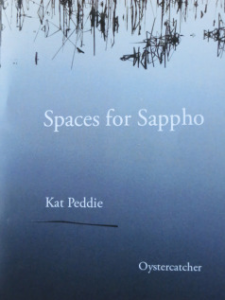I’ve been reading Peter Hughes’s Cavalcanty on a slow continuous loop since April, sometimes in longer binges but more often in snatched bursts on trains or station platforms. It’s an exceptional book and becomes more so with each re-reading, both a development of and a departure from his tussle with Petrarch in 2015’s Quite Frankly. Continue reading
Category Archives: Reviews
The s**r you steer by: Claire Trévien
When I wrote about Claire Trévien’s first collection The Shipwrecked House in 2013, I had never met the author. Since then we’ve collaborated on readings and an anthology, been sounding-boards for each other’s scribblings-in-progress, and shared more than a few glasses of wine. So what follows can’t pretend to be an objective “review” of Claire’s second collection Astéronymes (and there are plenty of good examples of those already). But with that caveat, I wanted to put some thoughts down because I think this book is doing something genuinely challenging, and the more I’ve come back to it over the past year, the more convinced I am that it’s really very good indeed. Continue reading
Remaking Myths
I spent Thursday at the excellent Remaking ancient Greek and Roman myths in the twenty-first century colloquium, which Dr Emma Bridges and colleagues had organised at the Open University in London. Coupled with a train journey there and back re-reading Sandeep Parmar’s Eidolon (of which more below), this made for a wonderfully myth-haunted day. Continue reading
Last Thursday’s book-launch
Last Thursday’s Oxford launch for Peter Hughes and Vahni Capildeo was by some margin the most fun I’ve had on licensed premises with a portable PA system. Both poets read brilliantly; the audience was engaged and responsive and laughed at all the right moments; the Oxford Wine Café’s friendly staff and delicious wines kept everyone suitably lubricated; and if the number of books bought and signed is any indication, the poems genuinely resonated with people. Continue reading
The Better Maker: Kat Peddie
Kat Peddie’s Spaces for Sappho, hot off the press from Oystercatcher, is impossible to categorise (and only an idiot would want to). The pamphlet’s 21 pages contain a mercurial mix of translation, versions, original poems and responses to other translations, all converging on the mysterious absent centre of the historical, textual Sappho. The effect is unsettling, vibrant and seriously moreish.
Out of Everywhere 2
Twenty years ago, Reality Street published one of the most influential poetry anthologies of our time. Out of Everywhere showcased linguistically innovative poetry by women in the UK and North America, definitively blowing apart the myth that experimental poetry is the preserve of shouty men in pubs. The range and quality of poetry in the book was extraordinary, and it’s as fresh today as it was in 1996 (to-date my copy has been to six countries across three continents, read on land, sea and air, and still retains the ability to surprise and startle). It has also influenced a generation of poets to push the boundaries of form and to believe in an audience for daring work. In short, it’s a hard act to follow. Continue reading
The world and the child: Peter Philpott
Peter Philpott’s Ianthe Poems is dedicated to the poet’s granddaughter, and many of the poems play with personae that might credibly be identified with the poet or the young Ianthe. There have been many poems — and indeed whole collections — about parenthood over recent decades, but notably fewer structured around grandparenthood. Continue reading
Ten: The New Wave
Ten: The New Wave is the successor to 2010’s Ten: New Poets, both books being a response to the Arts Council’s Free Verse Report’s 2005 finding that “less than 1% of poetry published by major presses in the UK [was] by black and Asian poets”. According to Fiona Moore’s write-up of the panel discussion at the book’s launch, the situation has since improved but is still materially and embarrassingly short of being representative (and, speaking as a straight, white, able-bodied man, yet another example of the over-privileging of people like me in the UK poetry world). Ten: The New Wave is a further step towards rebalancing this. It’s also hands-down the best poetry anthology of 2014 so far. Continue reading
The Fault of Language: Andrea Brady
Andrea Brady’s Cut from the Rushes is really two collections in one: a reissue of 2005’s Embrace and a new volume, Presenting. It’s also the most thrilling, visceral, challenging, uncomfortable and darkly-beautiful book I’ve read since… [I can’t finish this sentence because I can’t think of a suitable comparison: Cut from the Rushes is in a category of its own, and is simply stunning]. Continue reading
A Double Version: Lavinia Greenlaw
I’ve neglected this blog for the past month while I’ve been pleasantly overwhelmed with other poetry stuff: some great poems have started to come in for Rewiring History (and there’s still time to submit yours up until the 30th June); work on November’s poem/painting collaboration with artist Nick Maitland is progressing apace; and I’ve been busy revising the libretto for a children’s opera with composer Philip Sunderland (who has also just won an Olivier award for conducting ETO’s Paul Bunyan – congratulations, Philip).
The flip side of all this activity is that I’ve built up a backlog of books to review, and Lavinia Greenlaw’s A Double Sorrow is the one that’s been tugging at me most insistently. Continue reading

